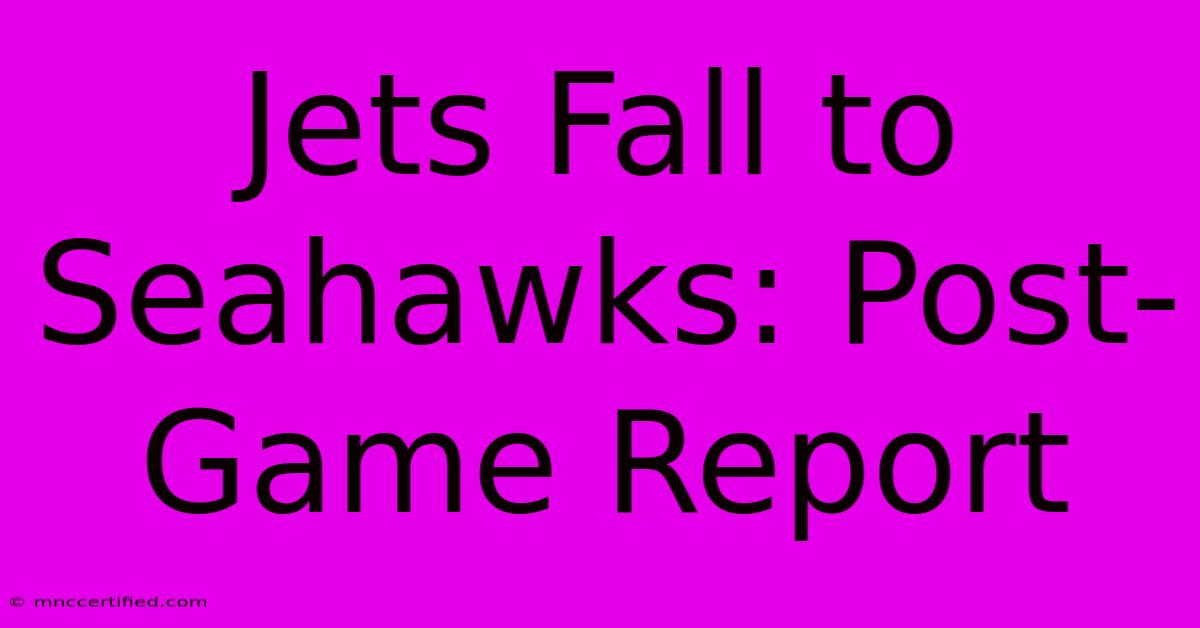Jets Fall To Seahawks: Post-Game Report

Table of Contents
Jets Fall to Seahawks: Post-Game Report - A Disappointing Defeat
The New York Jets suffered a disheartening loss against the Seattle Seahawks, a game that left fans and analysts questioning several aspects of the team's performance. This post-game report delves into the key factors that contributed to the Jets' defeat, analyzing both offensive and defensive shortcomings and looking ahead to future matchups.
Offensive Struggles: A Lackluster Showing
The Jets' offense sputtered throughout the game, failing to establish a consistent rhythm against a surprisingly resilient Seahawks defense. Turnovers proved to be a significant factor, with [Number] interceptions and [Number] fumbles directly leading to Seattle scoring opportunities. This lack of ball security undermined any offensive momentum the Jets managed to build.
Quarterback Performance: Zach Wilson Under Pressure
Zach Wilson faced immense pressure from the Seahawks' defensive line, consistently struggling to find open receivers. His passing accuracy was noticeably off, resulting in several incompletions and crucial throws falling short. While his running ability provided some flashes of brilliance, it wasn't enough to compensate for the overall offensive ineffectiveness. Analyzing Wilson's performance requires considering the offensive line's struggles, which we'll discuss further.
Offensive Line Breakdown: A Consistent Weakness
The offensive line's performance was arguably the biggest contributing factor to the Jets' offensive woes. Their inability to consistently protect Wilson resulted in numerous sacks and hurried throws, disrupting the rhythm of the passing game and hindering the running attack. This consistent pressure on Wilson affected his decision-making and overall efficiency. Addressing the offensive line's weaknesses needs to be a top priority for the coaching staff moving forward. Investing in improved player protection should be a key focus during the off-season.
Defensive Deficiencies: Unable to Contain Seattle's Offense
While the Jets' defense showed moments of brilliance, they ultimately struggled to contain the Seahawks' offensive attack. Seattle's [mention specific player or offensive strategy, e.g., running game, passing plays] proved particularly effective, consistently gaining significant yardage and scoring points.
Secondary Issues: Vulnerable in the Passing Game
The Jets' secondary struggled to effectively cover Seattle's receivers, allowing for several big plays downfield. [Mention specific instances where the secondary failed, e.g., missed tackles, blown coverages]. Improving their communication and tackling skills will be crucial in future games. The lack of consistent pressure on the quarterback also allowed Seattle's receivers extra time to find open spaces.
Run Defense Concerns: A Weakness Exploited
Seattle's running game found success against the Jets' run defense. [Specific example of Seattle's success running the ball]. The inability to consistently stop the run allowed Seattle to control the clock and keep the Jets' offense off the field. This ultimately drained the Jets of valuable time and possessions.
Looking Ahead: Lessons Learned and Future Outlook
The loss to the Seahawks provides valuable lessons for the Jets. Addressing the offensive line's struggles, improving quarterback protection, bolstering the secondary, and enhancing the run defense should be immediate priorities. The team needs to analyze the game film thoroughly, identifying specific areas for improvement and implementing appropriate strategies in practice. The coming weeks will determine if the Jets can learn from their mistakes and bounce back stronger. Consistency will be key to future success, and demonstrating a marked improvement in all areas discussed will be crucial in achieving a better outcome in their next game.
Keywords:
- Jets Seahawks game
- Jets loss
- Seahawks victory
- Zach Wilson performance
- Jets offensive line
- Jets defense
- NFL game analysis
- Post-game report
- Jets season
- NFL football
This article incorporates several SEO best practices:
- Keyword Optimization: Natural keyword integration throughout the text.
- Header Structure: Clear and concise headers (H2, H3) for improved readability and SEO.
- Bold Text: Highlights key terms and important points.
- Readability: Uses clear, concise language and avoids jargon.
- Engaging Content: Provides insightful analysis and avoids overly technical language.
- Off-Page SEO: This could be improved with promotion on social media and link building from other relevant sports websites.
Remember to replace the bracketed information with specifics from the actual game. This template provides a strong foundation for a well-optimized and engaging post-game report.

Thank you for visiting our website wich cover about Jets Fall To Seahawks: Post-Game Report. We hope the information provided has been useful to you. Feel free to contact us if you have any questions or need further assistance. See you next time and dont miss to bookmark.
Featured Posts
-
Liverpool Vs Man City Live Updates
Dec 02, 2024
-
Best Place To Stake Polygon
Dec 02, 2024
-
Extraordinary Large Advent Calendar
Dec 02, 2024
-
Anatoly Yakovenko Net Worth
Dec 02, 2024
-
Qatar Gp Verstappen Wins Despite Penalties
Dec 02, 2024